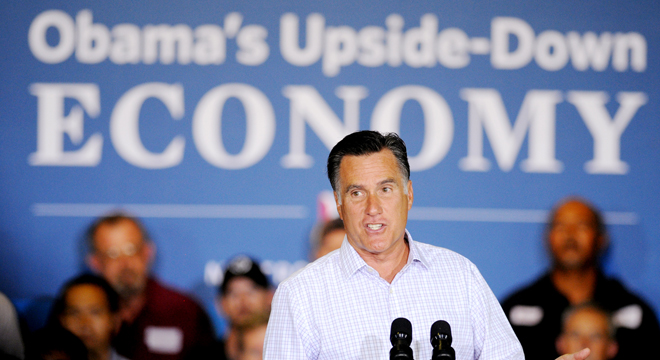Mitt Romney loves the ’90s, apparently — he is making President Bill Clinton’s 1996 welfare reform bill the centerpiece of his campaign this week. But his accusations that President Obama is trying to “gut” the program by waiving its work requirements don’t jibe with the administration’s actual work guidelines. They also sidestep the fact that Romney himself supported such changes — he was just one of the Republicans who lent similar requests bipartisan support.
In a speech in Illinois Tuesday, Romney praised Clinton and Republicans for saying “they did not want a culture of dependency to grow in our country, but instead wanted people to have the blessings of work.” By contrast, he said, “President Obama, in just the last few days, has tried to reverse that accomplishment, by taking the work requirement out of welfare. That is wrong, if I’m president I’ll put work back in welfare.”
His speech came on the heels of a new campaign ad asserting that “Under Obama’s plan, you wouldn’t have to work and wouldn’t have to train for a job — they just send you your welfare check.”
White House press secretary Jay Carney called Romney’s charges “categorically false” and “blatantly dishonest” in his Tuesday briefing.
The claim that the administration’s changes amount to an “end” to welfare aren’t new — they popped up in July when they were first announced. But they are especially misleading given that the move by the Department of Health and Human Services came in response to requests from at least two Republican governors in Utah and Nevada, who complained paperwork requirements and narrow participation metrics were hampering their ability find recipients work. This had been a complaint from Republican-led states in the past: Romney himself signed a letter with 28 other Republican governors in 2005 requesting Congress grant waivers to allow more flexibility in administering the program.
Nor was the waiver in question intended to circumvent the law’s original intention of putting welfare recipients to work. As the Obama campaign noted, the July HHS memo said that states would have to prove that any changes would boost employment, a position that HHS Secretary Kathleen Sebelius reiterated last month after a slew of similar attacks from House Republicans.
“The Obama administration, working with the Republican governors of states like Nevada and Utah, is giving states additional flexibility only if they move more people from welfare to work — not fewer,” Obama campaign spokeswoman Lis Smith said in a statement.
As part of Romney’s welfare blitz, his campaign held a conference call with reporters rejecting the Obama campaign’s rebuttals.
Jonathan Burks, the Romney campaign’s deputy policy director, pointed to a single phrase in the HHS memo. “One of the items in which they express their willingness to issue waivers,” he said, “is a project that ‘demonstrates superior employment outcomes in lieu of participation rate requirements.'” But the same memo also says that “HHS will only consider approving waivers relating to the work participation requirements that make changes intended to lead to more effective means of meeting the work goals.”
Burks had other counterpoints at the ready — some more accurate than others. For instance, the states of Utah and Nevada — both run by Republican governors — sent letters to HHS asking for more flexibility in their welfare-to-work programs. But Burks claimed Utah Gov. Gary Herbert wanted flexibility on administering TANF, not exemption from participation rate requirements.
Herbert’s letter to HHS shows otherwise. While the letter complains about cumbersome paperwork, it ultimately recommends precisely what the Obama administration’s memo puts into action: allowing states to replace participation requirements with other measurable outcomes. The letter says that “Participation in federally defined activities has become the outcome of the TANF program” while “Employment should be the measure of success.”
The letter specifically suggests “participation” as a metric where they could use more latitude:
“Freedom to tailor services, participation, work preparation to the family and the economic service area without strict regard to narrowed definitions of allowable activities will give us the ability to test out other models that may be better designed to an area’s resources and economic realities.”






